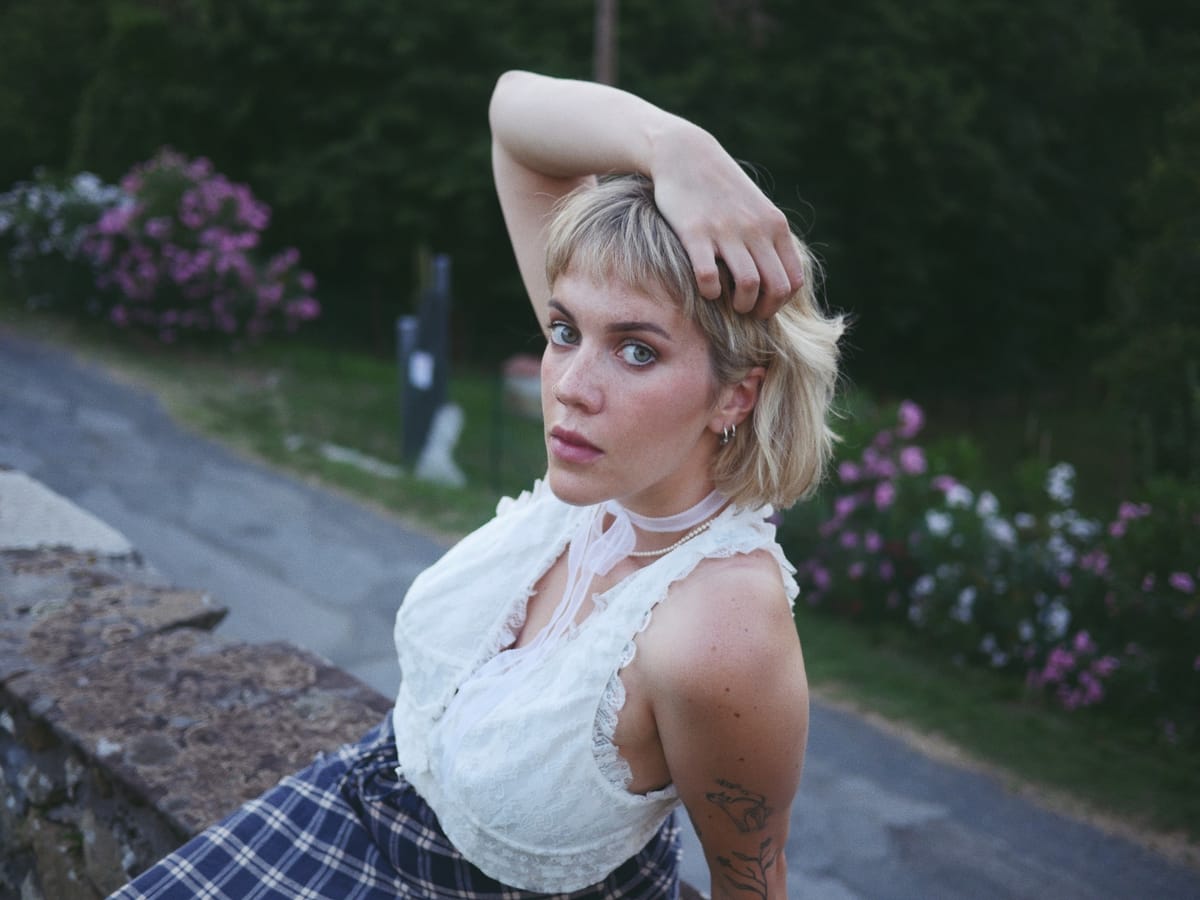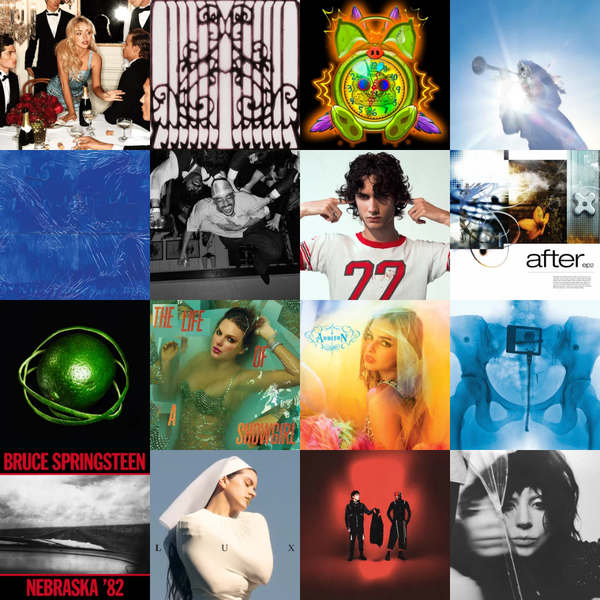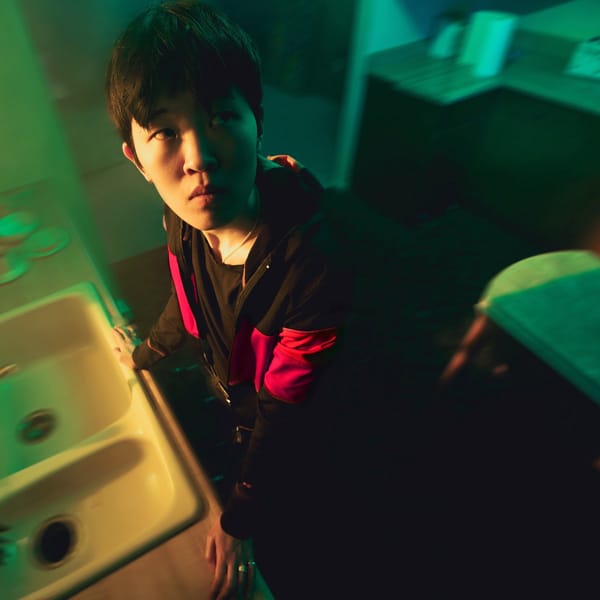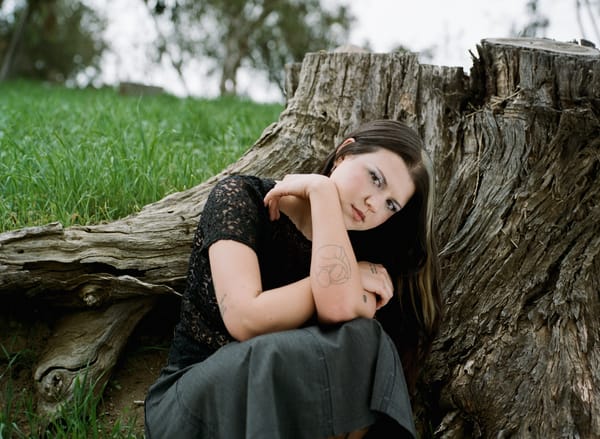The Depths #2: Bess Atwell On Working With Aaron Dessner and Writing Autistic Anthems

Hey all, if you're just joining us, I'm Hannah Jocelyn and this is my newsletter Transient Peak. Subscribe for exclusive interviews, reviews, and much more! (If you like it, make sure to support me on the paid tier too!)
Enjoy this second issue of The Depths, a spinoff of my flagship series Nothing Deep To Say where it turns out there's a lot of deep things to say.
A theme I’m noticing with some interviews is that people don’t know what they’re really writing about when they’re writing a record. Celeste Taucher of Talker didn’t know she was writing a breakup album or a queer awakening album; Bess Atwell didn’t know she was writing an album of “autistic anthems.”
Light Sleeper is Bess Atwell’s third album, and her first collaboration with Aaron Dessner of the National. I’ve written about them as long as I’ve been writing about music, so I was immediately looking forward to hearing what they did together.
Sleeper features many Dessner trademarks - pianos, rubber bridge guitars, whirring doohickeys on the edges of the mix- but this is the first one he didn’t co-write in a long time. The process still became collaborative, and Dessner eventually included frequent guests like James Krivchenia from Big Thief on drums. This is Atwell’s album, though, and her lyrics breathe new life into the ubiquitous themes of mental health and its impact on relationships.
For this series I’m more interested in aspects of people’s identities they don’t often talk about, which could be queerness, but in this case is autism. As “The Weeping” details, Atwell took care of her severely challenged non-verbal sister well before she learned about her own autism diagnosis. To me, “The Weeping” is something of a sibling itself, to Aaron Dessner’s ode to his twin “Brycie”, a connection I hadn’t made until writing this intro.
My own twin brother had to be attuned to me growing up (I’m not non-verbal, but I am autistic), and it honestly felt like he wrote “Weeping”, just as “Brycie” felt like I wrote it about my brother.
“Weeping” closes with my favorite set of lyrics I’ve heard all year, though I’ll concede it was released as a single last year:
I watch the sun go down behind the storage tower
Where they found a body seven years ago
It doesn’t feel like it’s been long enough to live here untouched by that
But everything bothers me
At least if no one else does, I know what I mean
I guess the weeping’s still coming out of me
On that note, this is one of my favorite interviews I've ever done. Watch this video below for further context, including a lovely moment where Dessner plays bits of famous National songs for Atwell:
Can you talk about how you and Aaron found each other?
I had toured with an artist called Eve Owen [Hannah note: also autistic], who’s become one of my best friends. She was actually the person who shut the door of the tiny dressing room we were in, and said “Can I say something that’s gonna sound rude? I think you're autistic.” And I was like “That's fine. So do I.” But she made a record with Aaron and sent him my music. I didn't know she'd done that, but she knew I was a massive fan and she thought he'd like it. Then he posted a story with “Time Comes in Roses” and it was a total shock. I mean, The National are probably my favorite band, so it was really surreal. I messaged him saying, “thank you. I'm a massive fan", and we started chatting from there.
Did “Time Comes in Roses” inform the lyrical direction of the new record?
In writing “Time Come In Roses”, I actually learned a lot because it was word vomiting, for lack of a better phrase, and realizing that actually really resonated with people rather than it just being a completely self indulgent and selfish exercise. I learned a lot from that song that I took forward onto this album.
Talk about the recording process.
I was only there for five days, and we did 13 songs… I mean, the record’s only 10. But we did more than that. And because it was such a short amount of time, we it was just me, Aaron, and his engineer Bella [Blasko]. Do you know about Bella?
Of course. I love to see Bella and Heba Kadry behind the boards. A lot of people will say that we need more women in music production and not actually hire them.
I’ve been guilty of that as well. Especially, for example, in a touring environment. And on my last record, it was mostly white guys. And my touring band at the moment is just a bunch of white dudes, and they're amazing. But I try to make a conscious effort to have some diversity in the support acts or wherever else I can control it.
What did you do in the 5 days?
It was just me and Aaron and Bella for four days, and then we had James Krivchenia from Big Thief on Friday, and he just smashed out all the songs in one day, and that was incredible. The rest we did across the Atlantic, just remotely. So some of the instrumentation you hear is me at home, but that's a very small amount. When Aaron was in sessions with other people, he would ask, “Oh, while we're here, would you mind just playing on this track of this artist I'm working on?” So I think he was incredibly nifty and managed to sneak in little bits for my record in sessions with other people.
It’s really surreal to look at it and just realized he formed this supergroup around my songs, of people that I've listened to for years.
I'm curious what changed the most when you were working remotely versus working in the studio?
We didn't have a huge amount of time to create a sonic world when actually in the studio, because of the nature of just getting down my guitar and vocal and drums. So we had the bare bones of songs that weren't really produced, minus the occasional bits that Aaron would hear, and then he'd jump onto an instrument. A lot of my favorite bits happened like that, like the guitar on “Sylvester.” We actually built the sonic world remotely. And I think I could have only done that with him,because I just completely trusted him. I knew that working with him, I was gonna have to relinquish a lot of control, because I just wouldn't be able to be there in person. So I would only do that with a producer that I know that I fully trust. And I'm a massive fan of his so I would only have worked with him like that.
How involved are you in production?
Pretty involved! On the first one Hold Your Mind, I remember I'd made these extensive demos, and written most of the extra guitar lines. It's what I'd been doing my whole teenage life instead of going out to parties, and so I came in with these very fully formed demos, like I've written all the parts, like all the drum parts, all the guitar parts, all the everything, all the bass parts. But then I was really scared, I just drowned in that environment. Everyone I worked with was really lovely, but it was a lot of older men, who all knew each other. And I was thrust into this place in North London with these guys, and I was a teenage girl and they were all session players. They were very nice, safe people. But I was intimidated. The only song I felt like really represented exactly what I'd imagined was “Cobbled Streets”, And I still love the production on that song to this day, because it was basically my demo.
Not to undermine the producer [Michael Smith], he did a great job. The Mellotron on that song was all him. I felt like that was a real collaboration, like several other songs on there, but I think I was just a bit swamped in that environment. And then the second album, I felt like it was very collaborative. But again, it was a lot of working with a lot of guys in a room, and I was still trying to find my voice. With each album, I've managed to have a bit more of a voice. Obviously, like I said, working with Aaron was different. He took a lot of the control, but it was like control that I was happy to relinquish. There's a lot of me in the production, but it's not like I co-produced any of them, or anything like that.
Did you have to push back on Aaron at all? Were there any moments where you went, “this is too National”?
I didn't feel like anything was too like the National. I think my concern was Folklore and Evermore. I loved the production on those records, but that’s why we stayed away from piano even though I love the piano that he used. I really trusted him, but I had to tell myself that just because you're a big fan, if there's something you really don't like, find the strength to say it. I was proud of myself because there was a song that I wrote in quite a strange tuning, and it’s really hard to find the bass that I was hearing. He laid some bass down that I just didn't understand, then I wanted to put some bass down that he didn't understand, but at the end of the tug of war, I was going to win because he's a great producer and he wants to support the artist.
In “Spinning Sun”, a lot of the original demo went on - I know, in Aaron's perfect world, some of those bits wouldn't have made it on. I’m glad they did, because as much as I highly respect Aaron's opinion, we were just hearing different things. I mean, that didn't have to happen much, but it happened a few times, which it should!
There are a lot of specific things on the record I want to ask about, like the reference to Leonard Cohen’s famous “there is a crack in everything/that’s how the light gets in” from “Anthem“, which is practically a rite of passage for musicians to reference at this point.
That was a worry when I wrote it, because it was such a stream of consciousness. I made a mental note to change it, because I thought that's cliche. Everyone uses that, you can't do that. You can't open the album in that way. But then I just thought back to “Time Comes In Roses” and thought, well, that's what came out. And that's what I mean, if I changed it, it wouldn't be what I mean. So, I mean, that was just a beautiful line. And I tried to take my ego out of it, but my ego was saying don't use that, you can't use that, everyone's used that, you need to do something original.
But you finish it with “and I’m blinded!”
I think that was like the only saving grace [laughs]
Post-autism diagnosis, how do you look at some of these songs? I’m thinking of “The Weeping” in particular.
That was written about my younger sister, who's got high-support-needs autism. I wrote that before I knew I was on the spectrum. In this song there's this sadness that's coming out of me constantly, and I can't seem to get control over it, and it was probably more complicated than simply growing up with an autistic sister. I felt such a connection to her even though she's nonverbal, and there's a reason I found it so hard to grapple with that relationship and her. Honestly, I'd call it a disability for her rather than a neurodivergence. I mean, she is obviously both but she is extremely disabled. I definitely looked at “The Weeping” differently with that diagnosis, and all of the songs like “Something Now” even. And I'd consider that one of my more poppy songs as well. But that is quite a bright, happy sounding song, and it's a celebration of feeling, but it's also tinged with a feeling that’s extremely challenging for me, because I feel so much that it overcomes me.
Let’s talk about the outro of “Weeping” - I love how you describe being so pent-up that even the smallest things can hurt you.
That’s so nice to hear how much it resonated and that you understood it. Funnily, I wrote it looking out of [this] window, which, unfortunately, you can't see it on Zoom, but on the other side, there's like a big tower block. I just could see people going home for the evening. And I was like, Why does everything hurt? Just all these uninvited thoughts and things you didn’t ask for, when everything’s overwhelming emotionally.
There’s definitely a heightened sensitivity to everything as autistic people. I’m curious how your family reacted to “The Weeping” because it’s such a personal song about family.
My mom finds that song really hard to listen to, to the point where when I played her my record, I had to skip over it. She didn’t say “you must skip over this.” But she was like, oh, do I have to hear that? She makes a joke out of it. I think when she sees me live, she can't escape that song. And she finds it quite difficult. I think my parents have found that song really confronting.
Something I really admire about the record is your subtle gender play - there's the line about four brothers on “Weeping,” and there's also "Sylvester", which is an alter ego of yours. I don’t know if that was something you were thinking about, but that's definitely a connection that I made while listening.
It's so nice to have someone notice those things. I just think of my music as being genderfluid. I've always had a fairly fluid perception of gender. I happily identify as a woman, but when I was young I cut off all my hair and asked everyone to call me James for a good year. I think a lot of especially neurodiverse people have a more accepting and fluid perception of gender. And I just never really felt like a girl. But I didn't feel like a boy, I just am.
I really enjoyed the masculine and the feminine, so I have four siblings. And I mean, on the one hand, it's just easier to sing "four brothers" rather than “two sisters and two brothers", but it felt like that's what we were, like we were brothers. I don't particularly connect, or not connect with gender - I think when I was young, I was like why can't I be the Prince? and I would get my nannies to play the princess, and I’d be like I'm gonna be Eric from The Little Mermaid. I just always enjoyed that gender play. I like that you noticed it, because I don’t think I did it consciously.
I feel like being trans causes me to have a higher sensitivity to gender play.
I didn't know you're trans!
Oh, well… I am!
Then you get it!
Going back to autism, I feel like a theme that I've heard through your music is trying to reassure and hold weight for yourself. There’s the line ”we're not diamonds, we’re a million things disguised as a whole” on "Hold Your Mind". Does having a diagnosis help reconcile those parts of you? I know that's a super heavy, heady question.
It’s something I think about every day. My mom said to me, and this is probably going to offend a lot of people as it offended me, but I also understand where she's coming from. As the mother of someone who's so severely disabled, she said to me, “I don't think your autism diagnosis has helped you”. And that really stuck with me, except that one, it's only been a year so I'm still finding my feet with it, and two, I think there's a part of me that agrees with her and is a bit scared by that. And then there's a part of me that really doesn't agree. It really helps me accept myself and understand myself and not beat myself up for things.
I'm a baby autistic in a way, so I think it's gonna take me a good few years to find my feet with how I feel about it. But I reckon it'll be a good thing, and I always strive to… I need to know things and I can know for sure about something – it had been an idea that was floating around for a good few years and something that had been suggested to me many times, and then not knowing was really difficult.
You were talking about “autistic anthems”, and I think the whole record is probably unintentionally, definitely, painted with neurodivergence, but I think I noticed it, especially in weirdly, my first record, which I don't like to bring up that much, because I was really young when I made it. I wouldn't make it the same way now, but there's “Cobbled Streets”, which is just about being autistic and being frustrated and having no idea. And loads of songs on that record, I just had no idea.” And I was singing about these things being like why?
That song has the line “should it be this hard?”, right?
It shouldn't!
If somebody says “I don't think that diagnosis has helped you”... not to reference one of the “Release Myself” lyrics, but there’s a lot of self-forgiveness you have to do - I feel like from the outside, it's like why aren't you working as hard? Why are you being lazy? But no, you’re actually being more comfortable.
I'm actually being myself and not beating myself up for the first time in my life. I think that's true. I think my mom, you know, she just loves me. And I think she's seen me and asked ”Why have you been in bed most of the year? you're depressed, you're reverting.” And I said ”I’m actually not depressed and I’m just accepting that I, after any social occasion, have to go to bed for a whole day.” And I’m not being horrible to myself about it.
How do you feel about talking about autism so often in interviews, especially as it’s become a part of the narrative?
The only thing I know how to do is be honest. So, you know, people are asking what my songs are about and I'm just going to tell them. It doesn't really occur to me not to, and maybe it should for self preservation, maybe I'm gonna learn that the hard way, because like I said, I've only known for a year, maybe that's not a lot don't have time to have spoken publicly about it, but I've done it now and I'm very open and I'm not ashamed. I've got nothing to hide. The reason I write music is to connect with people, so if they want to know more about me or what my songs are about, I'm just gonna tell them but it does open you up to criticism.
I did a TikTok about “The Weeping” when it came out, because labels love encouraging you to do TikTok, then you on and then you get onto this algorithm of autism haters. I was quite shocked because I was naive, and I’m not a really well known artist and not used to getting hate. I guess I'm trying to learn to be more guarded.
In an interview like this, where I know it is going to be written sensitively. I feel comfortable.
Unfortunately with autism, there's that difficulty with recognizing boundaries.
I know that with my autism, I struggle with exactly what you were saying, crossing boundaries, getting too personal when it's not appropriate. I then feel like I have that lack of boundary with myself. And I don't even realize when I'm talking about something that I'm going to actually be upset I opened up that much. Not in this instance, but in general, that’s happened, where I'm so open that I even crossed my own boundaries.
I'm very cognizant of that on my end, especially when I'm doing a more personal interview like this.
You need a great publicist who has talked to you about what you're comfortable talking about. Peter Quinn, before I started working with him, he said “Okay, what are you comfortable talking about, what are you not comfortable talking about,” and he’ll brief whoever, and I’m just like, “anything is fine!”
With my way of relating, I'd be a terrible interviewer. Because my way of relating to people is just to go “that happened to me, let me tell you about it. “
That's something I have to resist all the time! [Hannah note: but not that time, apparently]
I think that lends itself to a good interview, because then you get more out of the person since it’s more like a conversation, rather than just being “okay, cool, next question.” But that's just my opinion.
What’s next for you?
From the time the album releases, I’m touring on and off, doing an in-store tour in the UK, a trio of headline shows, then I’m playing in Europe with the National. It's gonna be incredible. And then we’re doing a headline tour in the UK in Europe in autumn. I'd love to be coming to America, but I just can't afford it.
It’s almost too expensive to tour with a band in the UK. All you have to do is the maths, like how much do you get from the ticket sales, how much of that actually goes to you. And then think about the price of each musician and the travel and their hotels and it's thousands a day to be on the road with the band. But then if I don't play with the band, people are like, Hmm, that didn't sound like the record. And I’m like, give me a million pounds and I'll play you the record, I‘m gonna go out with a band, but I can only afford to do that really in the UK and a bit in Europe.
I recently saw an article about the lack of support for bands in the UK, it’s tough.
It’s impossible for everyone, I think, but it’s good people are talking about it.
Thanks for reading! I'm taking a brief hiatus for a week or two, then I’ll be back with even more Nothing Deep To Say and the debut of the Silent Majority series.


